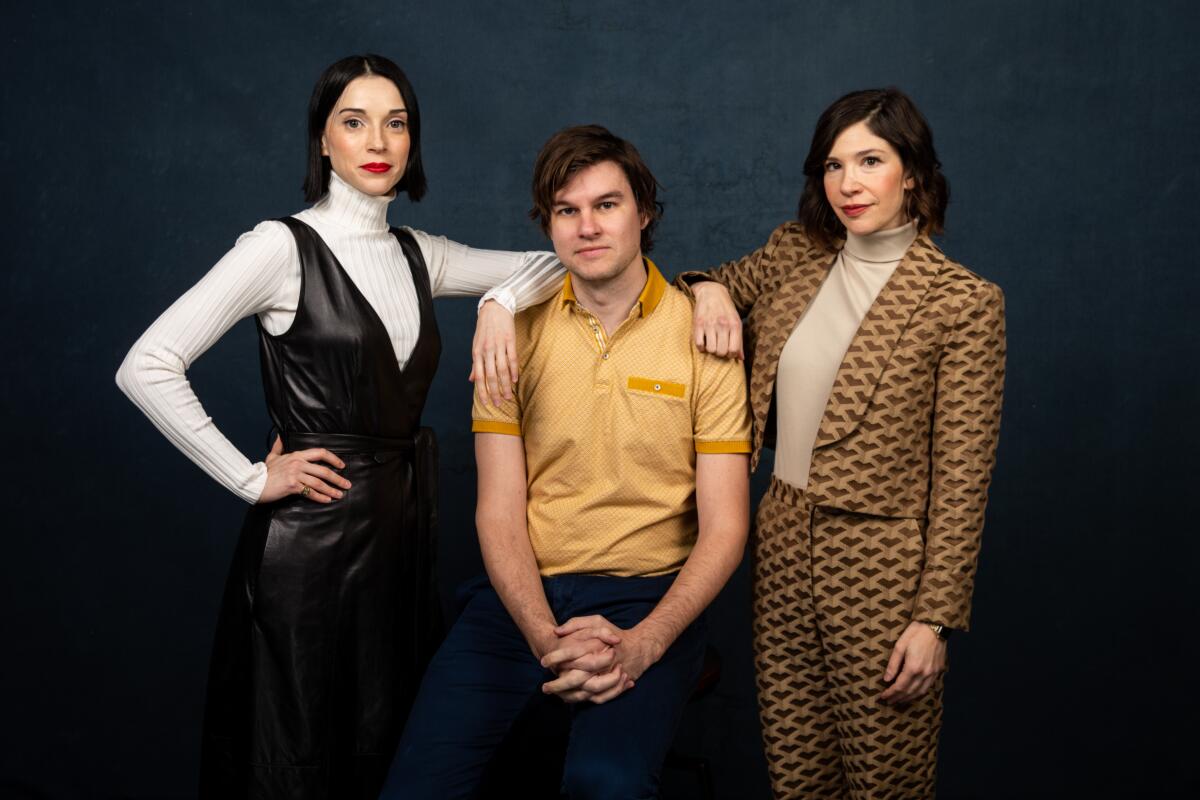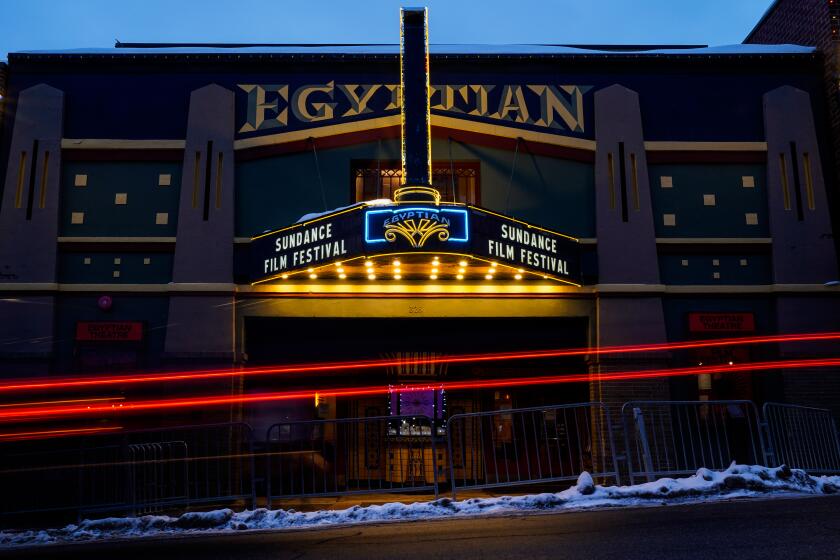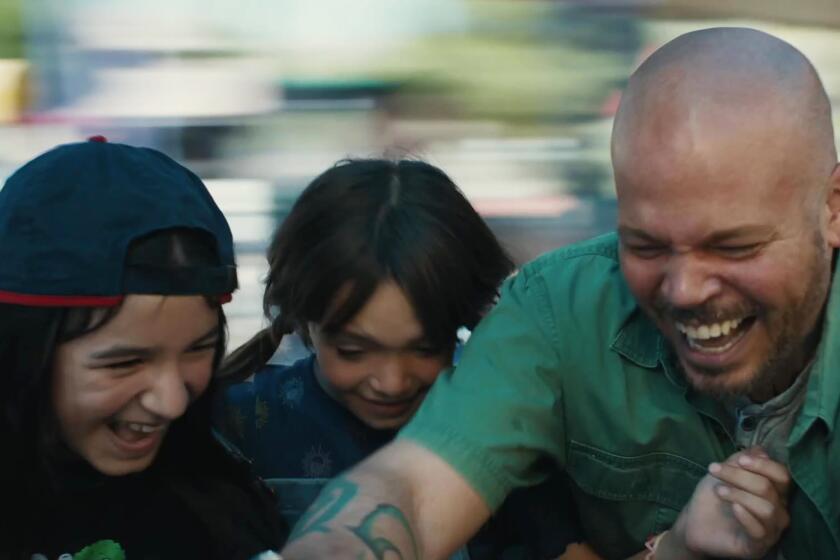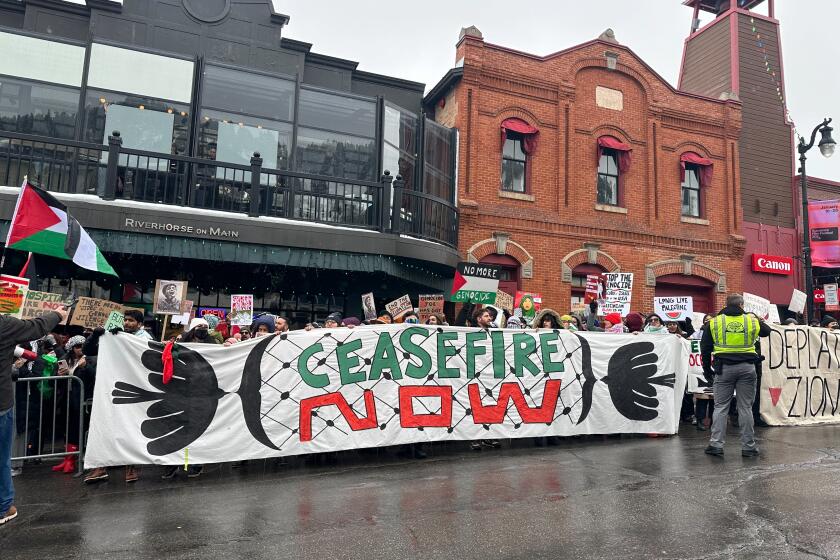Annie Clark, St. Vincent and Carrie Brownstein all meet at ‘The Nowhere Inn’

- Share via
PARK CITY, Utah — The tedium and drama of the life of a musician on the road has been the stuff of countless songs, albums, documentaries and fiction features. With “The Nowhere Inn,” close friends Annie Clark and Carrie Brownstein turn the concept inside-out, creating a fictional story in which they play heightened versions of themselves, featuring real concert footage and daring the audience to keep up.
Clark is a two-time Grammy winner for her work under the name St. Vincent. Brownstein is a founding member of the influential band Sleater-Kinney and a nine-time Emmy nominee for her work as cocreator, writer, director and performer on the comedy show “Portlandia.”
“The Nowhere Inn” is directed by Bill Benz from a screenplay credited to Clark and Brownstein. The movie follows Clark on tour as St. Vincent, with Brownstein attempting to make a documentary. Wanting to get something more personally revealing, the on-screen Brownstein encourages the on-screen Clark to explore the distinction between her low-key real self and the haughty persona of St. Vincent, which leads to much discord and confusion between the two of them.
Genuine pieces of Clark’s own life — her father being in jail, tabloid-targeted celebrity girlfriends — are depicted as funhouse mirror exaggerations. And there are some ripping St. Vincent concert sequences, plus Clark and Brownstein are seen writing songs together, include the movie’s title track, “The Nowhere Inn.”
The film, currently seeking distribution, is playing as part of the midnight section at Sundance and is also scheduled for the South by Southwest Film Festival in Austin, Texas, in March. The day after their world premiere, Clark, Brownstein and Benz are scattered about a hotel suite in Park City. Brownstein is wearing glasses, dressed in jeans, a long scarf and a turtleneck, Clark in leggings and an oversize sweatshirt, both nevertheless exuding a certain cool, off-duty glamour.
An opening night selection at Sundance this year was the documentary “Miss Americana,” a behind-the-scenes look at musician Taylor Swift. (Clark and Swift collaborated on a song together on Swift’s most recent album, and they have both worked with producer Jack Antonoff.) Though Clark doesn’t mention it by name, that film’s straightforward approach is exactly the kind of thing she and Brownstein were looking to subvert when they set out to make a film of their own.
As Clark said, there were a few central operating principles at work in making “The Nowhere Inn.”
“I think one of the theses for this was that any documentary about a musician is still going to be a controlled narrative controlled by the musician,” said Clark. “And there are certain tropes that go along with that. With these concert films, there’s the idea of coming home, back to the family kind of thing. Go back to your roots. There’s the idea of childhood trauma or a big strife that you overcame. There’s just kind of ruminations on fame. So we touched on all of those things, all of the tropes of these docs, but in a really left-handed way.”
The Los Angeles Times staff picks their favorite films from Sundance 2020, where indie gems and bold voices premiered new films.
Clark had footage filmed at a few St. Vincent concert dates in early 2018, roughly at the same time that she and Brownstein were working on the script. Clark originally tapped Brownstein to write sketches to tie together concert moments, but they soon began concocting something more ambitious, more fiction feature than concert doc.
They eventually contacted Benz, who had worked with Brownstein on “Portlandia.” Shooting scenes in spring 2019, they wanted to make something more akin to Donald Camell and Nicolas Roeg’s “Performance,” Roeg’s “The Man Who Fell to Earth” or Peter Watkins’ “Privilege,” feature films that explored a heady territory that twisted fiction and reality.
“It was presented to me as a Nicolas Roeg, psycho-thriller comedy,” said Benz. “I know you guys went through multiple different versions of it, but it came to me as, ‘We’re doing this ’70s British rock-doc craziness.’ And that was an easy direction to take for me.”

Brownstein noted that there is a formalism inherent to Clark’s work as St. Vincent, which some interpret at seriousness. However, there is often a wit and humor both within the music itself and its visual presentation.
“I consider my music hilarious,” said Clark.
When Brownstein branched out from music to comedy as cocreator of “Portlandia,” Sleater-Kinney was on hiatus, so the two creative pursuits still felt separate. Now, with “The Nowhere Inn,” she can bring them together.
“I guess it feels like some kind of perfect culmination of those things,” said Brownstein.
“This was like a chance to have some moments of levity but actually explore things that were darker and stranger. We didn’t want it to be improvisational, we didn’t want that casualness. And so I think for both Bill and I, coming from places where people’s expectations of us is a looser, kind of almost amateur environment, we both, I think, had something to prove.
“And Annie already has that; people already consider her someone who is a very composed artist, someone who embraces that kind of elegance. And so I think for Bill and I, we had a little more to prove. I guess in that sense it was a nice combination. I think between the three of us, we were all getting something out of it that we’ve been wanting.”
This was kind of our way of getting to, in a very bizarre way, set the record straight.
— Annie Clark, on the fictionalized St. Vincent tour film, ‘The Nowhere Inn’
Amid the film’s ambitious curlicues and satirical ridiculousness is a certain oblique sincerity. Clark’s father was sentenced to prison in 2010 for his part in a stock manipulation scheme, something she has rarely commented on but gestures to in the film. And she has for the most part kept her private life private, with a few high-profile exceptions.
“I hope that the film, as much as it’s fictionalized, it’s very heartfelt,” said Clark. “There are moments and aspects to a lot of the things we include and write about that are really close to the bone and painful experiences. And it’s mixed in with obviously the fictitious side. But there are certain things, like when I was like, ‘Carrie, we should write about my dad,’ that’s pretty horrifying really.
“So often, things get said about you that you don’t really necessarily agree with or weren’t your intention. And this was our way of getting to, in a very bizarre way, set the record straight.”
Clark looked at Brownstein and asked, “Would you agree with that? Kind of. Not really.”
“No, I do agree with it,” said Brownstein. “Because we come at truisms in a way that kind of circumvents them a little bit, so that we are commenting on the kind of craven nature, the voracious nature of an audience and also of the artist. It’s exploitative, and we’re each sort of exploiting each other in the film. And so it was a way of thinking about how do we employ our own sense of authenticity, our own sense of likability? You still kind of use it as a currency, but then you want to remove it when its inconvenient. I think we were able to toy with those things a little bit.”
“In other ways, just on the heartfelt tip,” Clark said, “the film — and it wasn’t even something I was expecting — but when it finally came together and I saw it, it’s a really sweet distillation of our friendship over the years. I find that part about it really heartening, even though obviously I become a monster and drive you insane and alienate you and ruin your life.”
Some of the film’s most outrageous scenes include Dakota Johnson, playing the role of Clark’s girlfriend. In real-life, Clark has been in very public relationships with model Cara Delevingne and actress Kristen Stewart (and she and Brownstein also dated years ago) and so the movie skewers the public’s desire to know more about her romantic life.
It is another willful gesture to address something people want to know about her in a way that is both straight-on and enigmatic.
“For sure,” said Clark. “Part of that is again going back to sort of stories that got told that I didn’t get to tell, whether it’s the Daily Mail telling that my dad was in jail or being in a relationship with somebody who was very crazily paparazzi famous and having that kind of attention that I had never had and wasn’t prepared for or expecting. Definitely, the Dakota thing was having fun with that.”
Again Clark turns to Brownstein and asks, “Did I just say too much?”
“No, I mean that’s right,” answered Brownstein. “I didn’t feel like you said too much.”
“OK, that’s good,” said Clark. “Are you sure?”
“Yeah, because in these scenes, you are the one manipulating the whole thing, especially in the scenes with her,” said Brownstein. “It’s sort of a reversal of how you experienced those other things, partly as a bystander and sort of a willing participant but not really necessarily wanting to buy into the whole thing. And so in the film, you turn the tables on that, where you’re taking this famous girlfriend and embracing it and completely tormenting her.”
Clark, credited as St. Vincent, produced “The Center Won’t Hold,” the most recent record by Sleater-Kinney. The album marked a musical shift for the group, and longtime drummer Janet Weiss left shortly before its release, noting in a statement, “The band is heading in a new direction and it’s time for me to move on.” Among some fans of the group, Clark became a controversial presence, seen as a divisive influence.
Brownstein dismisses any notion that “The Nowhere Inn” might also be addressing anyone questioning the creative dynamic between herself and Clark.
“To me, the word ‘controversial’ even surrounding Annie just seems such a mischaracterization of anything that she represents,” said Brownstein. “She’s such an artist. She’s fearless, and I think so much of this film is actually about rejecting that feeling or trying to just keep at bay being at the mercy of other people’s imaginations.
Directors Emerald Fennell, Julie Taymor, Josephine Decker and Radha Blank all brought new work to the Sundance Film Festival.
“It is about keeping something at the core that allows vulnerability. And that’s what this collaboration is between Annie and I and between Bill and the two of us. Not listening to that stuff. Cause you can’t, it’s stultifying. You can’t do anything if you’re operating with the vicissitudes of some other people.”
The pair wound up writing three songs for the project, including “Palm Desert,” intended as Carrie’s theme, and another intended as Annie’s theme. (Clark also wrote the film’s score.) The film’s title song is a saga of narcissism, self-mythologizing and purgatory to rival “Hotel California” and a metaphor for the treadmill of rock stardom. And within the exaggerations and distortions of “The Nowhere Inn” there is something honest and true about friendship, identity and creativity.
“I think one of the ideas we were playing with was wondering why we or anyone else wants to know so much,” said Brownstein. “What revealing more does for the art or the audience.”
“I think we’ve revealed so much in this,” Clark said, “but not in a way that people expected. And that had it been a straight-ahead doc, I think it would have been somehow more fictitious.”
More to Read
Only good movies
Get the Indie Focus newsletter, Mark Olsen's weekly guide to the world of cinema.
You may occasionally receive promotional content from the Los Angeles Times.












